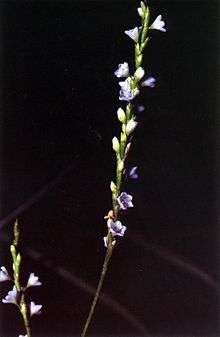Persicaria punctata
| Persicaria punctata | |
|---|---|
 | |
| Scientific classification | |
| Kingdom: | Plantae |
| (unranked): | Angiosperms |
| (unranked): | Eudicots |
| (unranked): | Core eudicots |
| Order: | Caryophyllales |
| Family: | Polygonaceae |
| Genus: | Persicaria |
| Species: | P. punctata |
| Binomial name | |
| Persicaria punctata (Elliott) Small 1903 | |
| Synonyms[1] | |
| |
Persicaria punctata (syn. Polygonum punctatum) is a species of flowering plant in the knotweed family known by the common names dotted smartweed[2] and dotted knotweed.
Persicaria punctata is native to the Americas, where it can be found in moist and wet habitat types from Canada to Argentina including the West Indies.[3][4][5] It is an extremely variable plant. It may be annual or perennial.
Persicaria punctatagrows from a rhizome and produces decumbent or erect stems which may just exceed one meter (40 cm) in length. The branching stems may root at nodes that come in contact with the substrate. The lance-shaped leaves are up to 15 centimeters long and have stipules widened into bristly brown ochrea that wrap around the stems. The inflorescence is a number of branching clusters of dotted greenish flowers with white edges, sometimes tinged pink.[6]
References
- ↑ The Plant List, Persicaria punctata (Elliott) Small
- ↑ "Polygonum punctatum". Natural Resources Conservation Service PLANTS Database. USDA. Retrieved 12 October 2015.
- ↑ Biota of North America Program 2014 state-level distribution map
- ↑ Soto Solís, D. A. 2014. Polygonaceae. En: Manual de Plantas de Costa Rica. Vol. VII. B.E. Hammel, M.H. Grayum, C. Herrera & N. Zamora (eds.). Monographs in Systematic Botany from the Missouri Botanical Garden 129: 358–383
- ↑ Carnevali, G., J. L. Tapia-Muñoz, R. Duno de Stefano & I. M. Ramírez Morillo. 2010. Flora Ilustrada de la Peninsula Yucatán: Listado Florístico 1–326
- ↑ Flora of North America, Persicaria punctata (Elliott) Small, 1903. Dotted smartweed, renouée ponctuée
External links
- Jepson Manual Treatment
- United States Department of Agriculture Plants Profile
- Illinois Wildflowers
- Calphotos Photo gallery, University of California
- photo of herbarium specimen at Missouri Botanical Garden, collected in Costa Rica in 1983